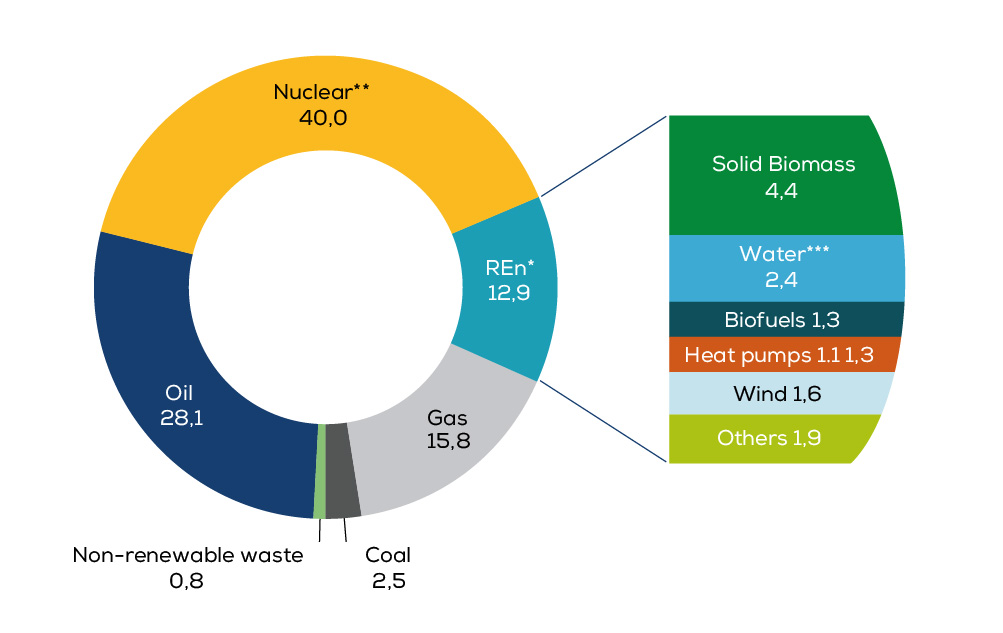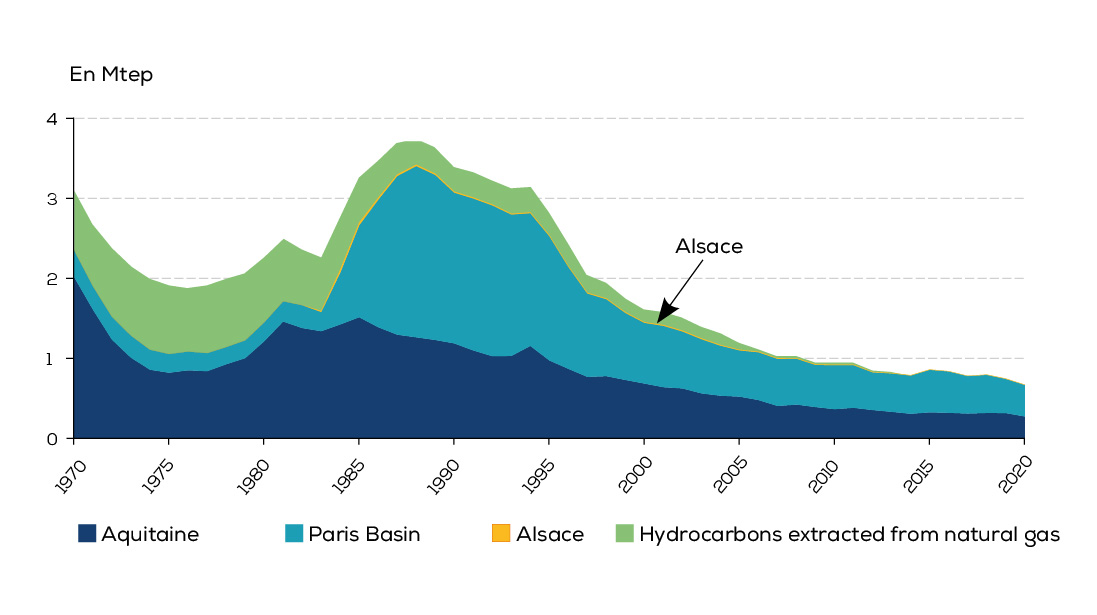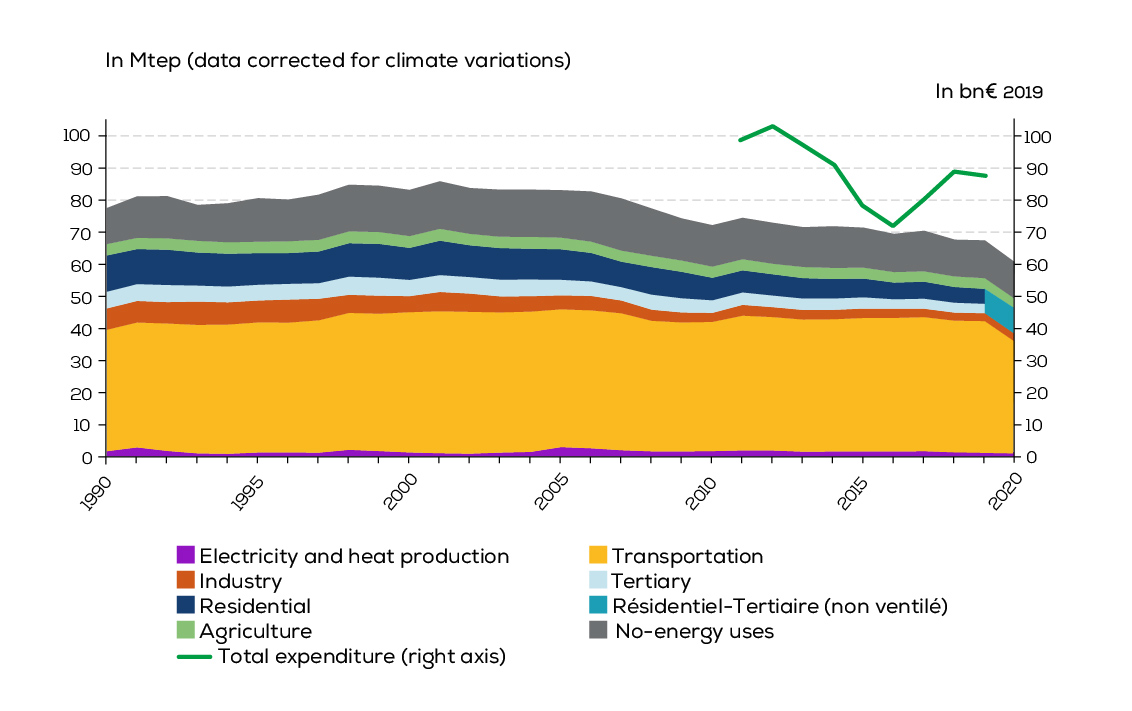Sustainable national
oil production
Breakdown of primary
energy consumption in France
Total: 245 Mtoe in 2019 (gross data)
In % (data not adjusted for climate variations)

* RE: renewable energies.
** Mostly corresponds to nuclear power production, after subtracting the electricity export balance.
Also included is hydraulic production from pumping performed by means of energy transfer stations, but this is still marginal compared to nuclear production.
*** Hydraulic, excluding pumping.
Scope: All parts of France (including overseas territories).
Source: DES, France’s energy balance
Primary production of oil
Total: 0.7 Mtoe in 2020

Crude oil extraction in France was 0.7 Mtoe in 2020.
This production has dropped more than threefold since the end of the 1980s and now represents only about 1% of national oil consumption.
On 1 January 2020, France’s reserves of crude oil (18.7 Mtoe) and hydrocarbons extracted from natural gas (Lacq, 0.12 Mtoe) represented around 28 years of operations at the current pace, and nearly three and a half months of national consumption.
Consumption of
refined products* by sector
Total: 60.4 Mtoe in 2020

In 2020, France’s total consumption of refined petroleum products (excluding biofuels), in data adjusted for climate variations was 60.4 Mtoe. It fell sharply over one year (-10.4%), mainly due to the fall in transport consumption (-16%): this sector, which accounted for more than half of consumption in 2020, was strongly affected by the traffic restrictions linked to the health crisis. Previously, this was already a downward trend since the mid-2000s, albeit at a much more moderate rate (-1.5% per year on average between 2005 and 2019). This long-term trend is mainly attributable to industry together with the residential and tertiary sectors, since petroleum use for transport had remained fairly stable between 1990 and 2019. Households, businesses and administrations spent €87 billion on oil and gas products in 2019. More than three quarters of this sum was spent on meeting transportation needs.
With oil or without oil?
Are you ready to give it up?
Oil cannot be replaced. It remains key to our modern life. It can be found in many uses in our daily lives
With Oil
Without Oil
With Oil – Without Oil
Oil in our
daily lives
Medicine
Modern medicine calls for petroleum products that cannot easily be replaced. Plastic is used in a wide range of medical devices, and petrochemical products play a role in manufacturing medication. Oil-based products include hospital equipment, infusion bags, aspirin, antihistamines, artificial limbs, dentures, hearing aids, heart valve prostheses and many more items.
Health &
Beauty
Many personal care products are derived from petroleum, including perfumes, hair dyes, cosmetics (e.g. lipstick, eye-shadow and blusher, foundation, mascara and eyeliner), hand creams, toothpaste, soap, shaving cream, deodorant, tights, combs, shampoo, glasses and contact lenses.
In the home
Our homes are bursting with products whose manufacture involves oil. This includes construction materials such as roof coverings and insulation materials, but also linoleum, furniture, white goods, and decorative items such as cushions, rugs, curtains and paint. Even everyday kitchen utensils such as crockery, glasses, non-stick pans and washing-up liquid are derived from oil.
Electronics
Plastics and other petroleum-based products are used in electronic components because of their insulating properties and resistance to heat. From speakers and smartphones to computers, cameras and televisions, most electronic products are derived from petroleum.
Sport
Many sports goods contain petroleum products, such as basketballs, golf balls and bags, football helmets, surfboards, skis, tennis rackets and fishing rods.
Textiles
Many garments are made with petroleum-based fibres such as acrylic, rayon, artificial leather, polyester, nylon and spandex. Petrochemicals are even incorporated into shoes and handbags to make them lightweight, durable and waterproof.
Oil operations in
the context of the climate plan
2017 LAW ON PHASING OUT HYDROCARBONS
Law No. 2017-1839 of 30 December 2017 putting an end to hydrocarbon exploration and exploitation, and enacting several provisions relating to energy and the environment, sets new conditions for our activity in practice:
No new exploration licenses for hydrocarbons will be granted, which brings an end to exploration for new reservoirs. Existing leases will not be renewable beyond 2040 except for specific situations of converting operations to obtain a linked substance (e.g. sulphur or geothermal energy). The ban on exploring for and exploiting oil and gas, including shale gas, is strengthened by supplementing the provisions of the law of 13 July 2011 prohibiting the practice of hydraulic fracturing.
Requests to extend the geographical scope of Bridge Energies submitted since 2016 fall within the legal and regulatory framework pursuant to the provisions of articles L. 142-12 and L. 142-13 of the French Mining Code, which are unaffected by the law of 30 December 2017.
